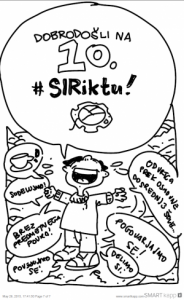Nasta Zupančič, Zavod sv. Stanislava, Škofijska klasična gimnazija, Ljubljana
In our Diocesan Classical Gymnasium a two-year Erasmus+ project under KA2 (Cooperation for innovation and the exchange of good practices) entitled Natural Science for Social Impact was running in school years 2014/15 and 2015/16. The applicant institution was our school, the partner school was from Belgium. The contents of the project were natural sciences, environmental education, sustainable development. Main goals were improvement of teaching natural science subjects, develop the natural science literacy and increase the students interests for natural sciences. The project included the Comparative Study of Natural Science Classes in Slovenia and Belgium, the issue of the brochure of class preparations of biology, chemistry and physics as examples of good practice, but the most important activity were four student exchanges. A group of 14 students stayed with their peers of partner school. The exchange programme was developed by science teachers of both schools. Because we were not bound up with curriculum, classroom and a 45 minutes lasting school hour, it was possible to give students completely different experience of these contents. One activity was natural science workshops performed by partner school teachers. Topics were from everyday life, interesting and actual, approaches were innovative and for students something new and attractive. For example: Belgium teachers prepared a real “criminal action research”, where students had to use simple procedures and tools from science, mathematics, technics and ICT fields and find the offender among suspects at the end. A big part of the exchange were visits of natural science and also cultural sights of partner state. The students were guided and directed by the experts, students had active roles in sightseeings and workshops . We visited several institutions, museums, lessons took place outdoor, in an urban and natural environment. In one week a lot of natural science and environmental contents took place, no time or space obstacles occurred. Students were relaxed, because the learning was informal. They were also involved with the evaluation of the work on the project. After first two exchanges their impressions, approvals and comments were collected, and that was useful for planning the next two exchanges. Also, we have to mention the socializing and learning together with Belgian peers , which enabled development of social skills in communication in English.
